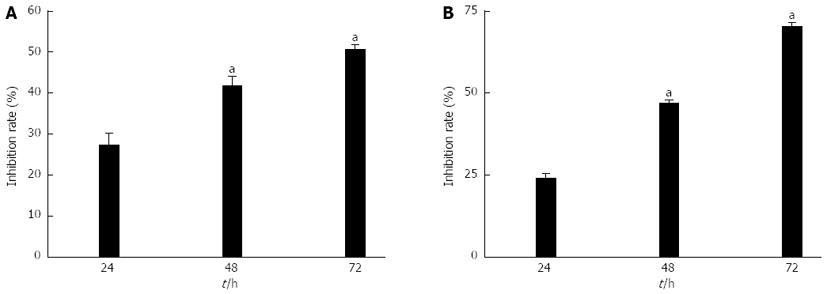Copyright
©2013 Baishideng Publishing Group Co.
World J Gastroenterol. Mar 21, 2013; 19(11): 1760-1769
Published online Mar 21, 2013. doi: 10.3748/wjg.v19.i11.1760
Published online Mar 21, 2013. doi: 10.3748/wjg.v19.i11.1760
Figure 1 Reduced viability of SGC7901 and MGC803 cells after adenovirus Class I phosphoinositide 3-kinase-RNA interference-green fluorescent protein treatment.
A: SGC7901 cells (7 × 104 cells/mL); B: MGC803 cells (7 × 104 cells/mL) cultured with adenovirus Class I phosphoinositide 3-kinase [PI3K(I)]-RNA interference-green fluorescent protein (RNAi-GFP) (50 MOI) and adenovirus negative control-RNAi-GFP for 24, 48, and 72 h. Cell viability was analyzed by MTT assay. Values were given as mean ± SD of three independent experiments. aP < 0.05 vs control group.
- Citation: Zhu BS, Yu LY, Zhao K, Wu YY, Cheng XL, Wu Y, Zhong FY, Gong W, Chen Q, Xing CG. Effects of small interfering RNA inhibit Class I phosphoinositide 3-kinase on human gastric cancer cells. World J Gastroenterol 2013; 19(11): 1760-1769
- URL: https://www.wjgnet.com/1007-9327/full/v19/i11/1760.htm
- DOI: https://dx.doi.org/10.3748/wjg.v19.i11.1760









